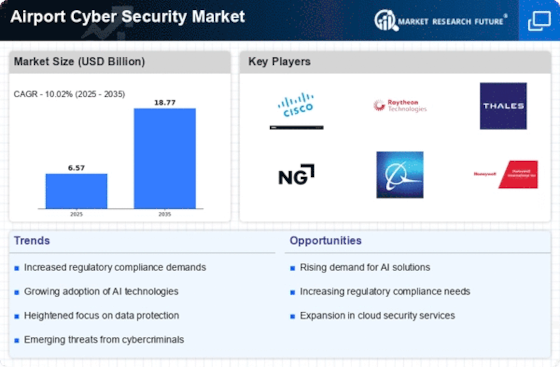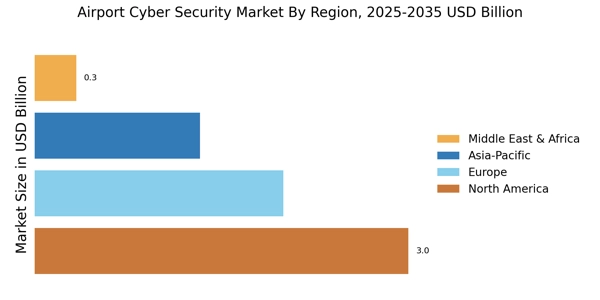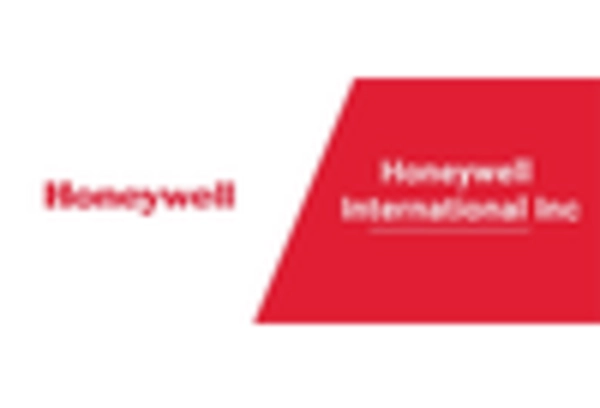Regulatory Pressures
Regulatory compliance is a significant driver in the Airport Cyber Security Market. Governments and aviation authorities are implementing stringent regulations to safeguard airport operations from cyber threats. For instance, the International Civil Aviation Organization (ICAO) has established guidelines that mandate airports to enhance their cybersecurity posture. Compliance with these regulations often requires substantial investments in cybersecurity technologies and training. As airports strive to meet these regulatory requirements, the demand for specialized cybersecurity solutions is expected to rise. This regulatory landscape not only influences the operational strategies of airports but also shapes the competitive dynamics within the Airport Cyber Security Market, as firms seek to offer compliant solutions.
Increasing Cyber Threats
The rise in cyber threats targeting critical infrastructure, including airports, has become a pressing concern. The Airport Cyber Security Market is witnessing heightened demand for advanced security solutions as cybercriminals increasingly exploit vulnerabilities. Reports indicate that cyberattacks on transportation systems have surged, prompting airports to invest in robust cybersecurity measures. This trend is likely to continue, as the aviation sector becomes more interconnected and reliant on digital technologies. Consequently, the need for comprehensive cybersecurity frameworks and incident response strategies is paramount. The Airport Cyber Security Market is thus positioned for growth, driven by the urgency to protect sensitive data and ensure operational continuity against evolving cyber threats.
Technological Advancements
The rapid advancement of technology plays a crucial role in shaping the Airport Cyber Security Market. Innovations such as artificial intelligence, machine learning, and blockchain are being integrated into cybersecurity frameworks to enhance threat detection and response capabilities. These technologies enable airports to analyze vast amounts of data in real-time, identifying potential threats before they materialize. As airports increasingly adopt smart technologies and IoT devices, the complexity of their cybersecurity needs escalates. This trend suggests that the Airport Cyber Security Market will continue to evolve, with a growing emphasis on integrating cutting-edge technologies to bolster security measures and protect critical infrastructure.
Public Awareness and Expectations
Public awareness regarding cybersecurity risks has significantly increased, influencing the Airport Cyber Security Market. Passengers are becoming more conscious of the potential threats to their personal data and safety while traveling. This heightened awareness is prompting airports to prioritize cybersecurity investments to meet public expectations. Surveys indicate that travelers are more likely to choose airports that demonstrate a commitment to robust cybersecurity practices. As a result, airports are compelled to enhance their security measures, not only to comply with regulations but also to build trust with their customers. This shift in public perception is likely to drive growth in the Airport Cyber Security Market as stakeholders seek to implement effective security solutions.
Investment in Infrastructure Modernization
The ongoing investment in infrastructure modernization is a key driver for the Airport Cyber Security Market. Many airports are upgrading their facilities and systems to improve operational efficiency and passenger experience. However, these modernization efforts also introduce new cybersecurity challenges. As airports implement advanced technologies, such as automated check-in systems and biometric screening, the potential attack surface expands. Consequently, there is a pressing need for enhanced cybersecurity measures to protect these modernized systems. This trend indicates that the Airport Cyber Security Market will experience growth as airports allocate resources to secure their upgraded infrastructures against cyber threats.


















